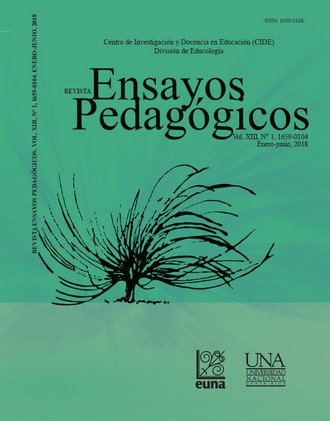Analysis of Reliability and Validity of a Questionnaire about Personal Learning Environments (PLE)
DOI:
https://doi.org/10.15359/rep.13-1.4Keywords:
educational research, research methodology, personal learning environments, validation of questionnairesAbstract
The study began with a pilot application a questionnaire (CPLE1, 78 items Likert related to personal learning environments) to 56 students of the course Technology Applied to Education of the University of Granada (Spain). This application allowed analyzing the reliability of the instrument and the effect of the elimination of some items on its reliability, by Cronbach alpha coefficient. An analysis of the internal consistency of the instrument by Corrected Homogeneity Index was also carried out. The study continued with the application of a guide to assess the content validity of the questionnaire (GVCPLE1). The results obtained with the implementation of this guide with ten experts were analysed using the Osterlind Congruity Index and through coding and categorization processes, which allowed suggestions that were incorporated, and a second validated questionnaire (CPLE2) was designed. This study shows how the access to the field has been accomplished; it makes a characterization of the students involved in the pilot study and of the expert participants in the validity analysis. Also, the statistical assumptions and the methodologies that were applied in the analysis are explained.
References
Andrich, D. y Schoubroeck, L. (1989). The General Health Questionnaire: a psychometric analysis using latent trait theory. Psychological Medicine, 19, 469-485.
Aron, A., Coups, E.J. y Aron, E.N. (2013). Statistic for Psychology. London: Pearson.
Barrazas, A. (2007). La consulta a expertos como estrategia para la recolección de evidencias de validez basadas en el contenido. Investigación Educativa Duranguense, 7, 5-14. ISSN 2007-039X. Disponible en
Cabero, J., Barroso, J. y Llorente, M. C. (2010). El diseño de entornos personales de aprendizaje y la formación de docentes en TIC. Digital education review, (18), 27-37. Disponible en .
Chacón, S., Pérez J. A., Holgado, F. P. y Lara, A. (2011). Evaluación de la calidad universitaria: Validez de contenido. Psicothema, 13(2), 294-301.
Chaves, E., Trujillo, J. M., y López, J. A. (2015). Autorregulación del aprendizaje en entornos personales de aprendizaje en el Grado de Educación Primaria de la Universidad de Granada, España. Formación Universitaria, 8(4), 63-76. doi:10.4067/S0718-50062015000400008
Chaves, E., Trujillo, J. M., y López, J. A. (2016). Acciones para la autorregulación del aprendizaje en entornos personales. Píxel-Bit. Revista de Medios y Educación, 48, 67-83. doi:10.12795/pixelbit.2016.i48.05
Chaves-Barboza, E., Trujillo-Torres, J. M., López-Núñez, J. A. y Sola-Martínez, T. (2017). Acciones y logros en la autorregulación del aprendizaje en entornos personales. Un estudio en el Grado de Educación Infantil en la Universidad de Granada. Journal of New Approaches in Educational Research, 6(2), 135-143, doi: https://doi.org/10.7821/naer.2017.7.236
Cronbach, L. J. (1951). Coeficient alpha and the internal structure of test. Psychometrika, 16, 297-334.
Cronbach L. J., Schoneman P. y Mckie, D. (1965). Alpha coefficient for stratified-parallel test. Educ Psychol Meas, 25, 291-312.
Flick U. (2004). Introducción a la investigación cualitativa. Madrid : España : Ediciones Morata.
George, D. y Mallery, P. (1995). SPSS/PC + Step. A Simple Guide and Reference. Belmont: Wadsworth Publishing Company.
Gravetter, F. J. y Wallnau. (2013). Statistics for the Behavioral Sciences. Belmont, CA: Wadsworth, Cengage Learning.
Gregory, R. J. (2001). Evaluación psicológica: Historia, principios y aplicaciones. México: El Manual Moderno.
Johnson, M. W. y Sherlock, D. (2014). Beyond the Personal Learning Environ- ment: attachment and control in the classroom of the future. Interactive Learning Environments, 22(2), 146-164. doi:10.1080/10494820.2012.745434
Howell, D. C. (2014). Fundamental Statistics for the Behavioral Sciences. Belmont, CA: Wadsworth Cengage Learning.
Larsen, R. J. y Marx, M. L. (2012). An introduction to mathematical statistics and its applications. New York: Prentice Hall.
Likert, R. (1932). A technique for the measurement of attitudes. Archives of Psychology, (140), 1-50.
McIver, J. P. y Carmines, E. G. (1981). Unidimensional scaling. Beverly Hills, CA: Sage.
Mendenhall III, W., Beaver, R. J. y Beaver, B. M. (2013). Introduction to probability and Statistics. Boston, MA: Brooks/Cole, Cengage Learning.
Millman, J. y Greene, J. (1989). The specification and development of test of achievement and ability. En R. L. Linn (Ed.), Educational Measurement. London: Macmillan.
Padua, J. (1987). Técnicas de investigación aplicadas a las ciencias sociales. México D.F.: Fondo de Cultura Económica.
Peters, C. C. y Van Vorhis, W. R. (1940). Statistical procedures and their mathematical bases. New York: McGraw-Hill.
Osterlind, S.J. (1989). Constructing tests items. Boston: Kluwer Academic Publishers.
Strauss, A. L. y Corbin, J. (1990). Basics of qualitative research. Londres: Sage.
Salkind, N. J. (1999). Métodos de Investigación. México: Prientice-Hall.
Schaffert, S. y Hilzensauer, W. (2008). On the way towards Personal Learning Environments: Seven crucial aspects. eLearning Papers, 9. Disponible en .
Strauss, A. L. y Corbin, J. (1990). Basics of qualitative research. Londres: Sage.
Streiner, D. L. (2003). Startin at the beginning: an introduction to coefficient alpha and internal consistency. Journal of Personality Assessment, (80), 99-103.
Wackerly, D. D., Mendenhall III, W. y Scheaffer, R. L. (2010). Estadística matemática con aplicaciones. México, D.F.: Cengage Learning Editores.
Walpole, R. E, Myers, R. H., Myers, S. L. y Ye, K. (2012). Probability & Statistics for Engineers & Scientists. New York: Prentice Hall.
Witte, R. S. y Witte, J. S. (2010). Statistics. Danvers. MA, EUA: Wiley
Downloads
Published
How to Cite
Issue
Section
License
Ensayos Pedagógicos is subscribed to the Attribution-NonCommertial-NoDerivatives 4.0 International Creative Commons Licence, which allows both authors and readers to freely download, store, copy, and distribute the final approved publisehd version of the manuscript (post-print) as long as this is done without commercial purposes, no derivative works are generated, and the source and author are mentioned. As well, Ensayos Pedagógicos declares that authors will remain the rightful owners of the copyrights of their work in perpetuity.







